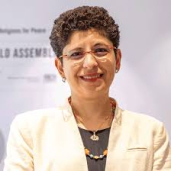BY ADITI GORUR AND JULIE GREGORY
Stimson Center
FREEDOM OF RELIGION OR BELIEF (FoRB) is a human right, recognized by the Charter of the United Nations, the Universal Declaration of Human Rights, the 1966 International Covenant on Civil and Political Rights, and the 1981 Declaration on the Elimination of All Forms of Intolerance and Discrimination Based on Religion and Belief.
Today, that right is being tested by rising or sustained violence against persons on the basis of religion and belief—a threat that is largely underrecognized by the international community, even as new data show increases in many types of such violence. As a result, there has been a noticeable gap in response from the UN Security Council and international human rights mechanisms.
What can and should be done, in the context of the United Nations and the UN Security Council?
This issue brief examines the issue of FoRB through a security lens, considers the impact of the increase in this type of violence, and sketches opportunities for the UN and member states to take action to prevent and counter it. This issue brief outlines the major trends in violence based on religion or belief, identifying recent rises in violence perpetrated by both state and non-state actors.
Next, it unpacks the links between restrictions on FoRB and violent conflict, and highlights conflict risks around religion or belief. The issue brief then summarizes important actions the UN has taken to prevent and counter violence based on religion or belief.
Finally, it explores key risks and opportunities for strengthening UN efforts, offering recommendations for UN member states to advance this agenda.
Learn more about Religions for Peace’s work on two of our Strategic Priorities: Freedom of Thought, Conscience, and Religion and Peaceful, Just, and Inclusive Societies.

Learn more about Prof. Azza Karam’s briefing to the UN Security Council during an Arria-Formula Meeting on the role of religion and multi-faith collaboration in conflict resolution and protecting members of religious and belief groups in conflict.